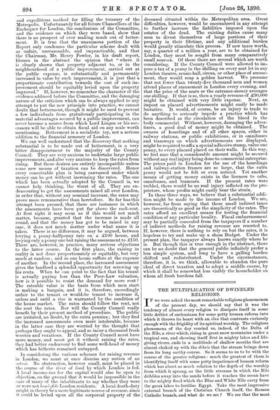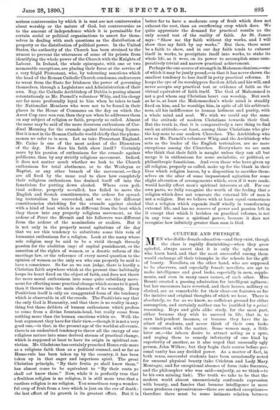THE MULTIPLICATION OF DWINDLED RELIGIONS.
IF we were asked the most remarkable religions phenomenon of the present day, we should say that it was the tendency of almost every religion to dissipate itself in some little driblet of enthusiasm for some petty human reform into which it throws its heart with an élan that contrasts curiously enough with the frigidity of its spiritual worship. The religious phenomena of the day remind us, indeed, of the Delta of the Nile, a river which, rising in great snow mountains under a tropical sun, and showing itself first in mighty lakes and life- giving rivers, ends in a multitude of shallow mouths that are almost choked up with the debris that the stream brings down from its long earthy course. So it seems to us to be with the course of the greater religions : much the greatest of them is identifying itself with some petty impatience of human reform which has about as much relation to the depth of the worship from which it sprang, as the little streams in which the Nile dribbles away into the sands before it reaches the ocean have to the mighty flood which the Blue and White Nile carry from the great lakes to fertilise Egypt. Take the most impressive external branch of the Christian Church itself, the Roman Catholic branch, and what do we see ? We see that the most serious controversies by which it is rent are not controversies about worship or the nature of God, but controversies as to the amount of independence which it is permissible for certain social or political organisations to assert for them- -selves in dealing with such questions as the distribution of property or the distribution of political power. In the United States, the authority of the Church has been strained to the utmost to prevent the utterances of some of its priests from identifying the whole power of the Church with the Knights of Labour. In Ireland, the whole episcopate, with one or two memorable exceptions, are placing their force at the service of a very frigid Protestant, who, by tolerating sanctions which the head of the Roman Catholic Church condemns, endeavours to wrest from the State for Irishmen the power of governing themselves, through a Legislature and Administration of their own. Nay, the Catholic Archbishop of Dublin is posing almost ostentatiously as Mr. Parnell's volunteer Whip, and his clergy are far more profoundly loyal to him when he takes to task the Nationalist Members who were not to be found in their places in the House of Commons on the day on which the Ascot Cup race was run, than they are when he addresses them on any subject of religion or faith, properly so called. Almost the same may be said of the more decorous enthusiasm of Car- dinal Manning for the crusade against intoxicating liquors. But it is not in the Roman Catholic world chiefly that the pheno- menon we refer to is seen. Let us take Protestant England. Mr. Caine is one of the most ardent of the Dissenters of the day. How does his faith show itself ? Certainly more by his passion of enthusiasm for the crusade against publicans, than by any strictly religious movement. Indeed, it does not matter much whether we look to the Church enthusiasm for total abstinence, or to the Wesleyan or Baptist, or any other branch of the movement, —they are all fired by the same zeal to show how completely their religious enthusiasm has drained itself off into the fanaticism for putting down alcohol. Where even poli- tical ardour, properly so-called, has failed to move the English and Scotch constituencies, the ardour for spread- ing teetotalism has succeeded, and we see the different constituencies shrieking for the crusade against alcohol with a kind of heat which is as different from the heat which they throw into any properly religious movement, as the ardour of Peter the Hermit and his followers was different from the ardour of the nominalists or realists. But it is not only in the properly moral agitations of the day that we see this tendency to substitute some thin vein of humanist enthusiasm for a religion. Look at the many whose sole religion may be said to be a vivid though thready passion for the abolition (say) of capital punishment, or the assertion of the rights of women, or a drastic reform of the marriage law, or the reference of every moral question to the opinion of women as the only sex who can properly be said to have a conscience. So far as we can judge, there is hardly a Christian faith anywhere which at the present time habitually keeps its heart fixed on the object of faith, and does not throw far more moral enthusiasm into some quite subsidiary move- ment for effecting some practical change which seems to it good, than it throws into the main channels of its worship. Even Positivism itself is only an exaggerated form of the tendency which is observable in all the creeds. The Positivists say that the only God is Humanity, and that there is no reality in any- thing but those driblets of human enthusiasm which profess to come from a divine fountain-head, but really come from nothing more than the human emotions within us. Well, the best argument they have for their view,—though it is not a very good one,—is that, in the present age of the world at all events, there is an undoubted tendency to throw all the energy of our religious nature into some derived stream of practical change, which is supposed at least to have its origin in spiritual con- viction. Mr. Gladstone has certainly preached Home-rule more as a religions faith than as a political counsel, and so far as Home-rule has been taken up by the country, it has been taken up in that eager and imperious spirit. The great Christian principle, "By their fruits ye shall know them," has almost come to be equivalent to " By their roots ye shall not know them." Now, while it is perfectly true that a fruitless religion is no religion, it is still more true that a rootless religion is no religion. You sometimes reap a wonder- ful crop of fruit from a tree which is just on the eve of death : the last effort of its growth is its greatest effort. But it is
better far to have a moderate crop of fruit which does not exhaust the root, than an overflowing crop which does. We quite appreciate the demand for practical results as the only sound test of the reality of faith. As St. James says : " Show me thy faith without thy works, and I will show thee my faith by my works." But then, there must be a faith to show, and in our day faith tends to exhaust itself in works, to precipitate itself into works, to stake its whole life, as it were, on its power to accomplish some com- paratively trivial and narrow practical achievement.
Perhaps the one source of strength in Mahommedanism,—one of which it may be justly proud,—is that it has never shown the smallest tendency to lose itself in petty practical reforms. It keeps the eye of its worshippers fixed on Allah and his will, and never accepts any practical test or evidence of faith as the virtual equivalent of faith itself. The God of Mahommed is not a god whom any Christian heart can worship. But such as he is, at least the Mahommedan's whole mind is steadily fixed on him, and he worships him, in spite of all his arbitrari- ness, all his indifference to human holiness and purity, with a whole mind and soul. We wish we could say the same of the attitude of modem Christians towards their God. But the truth is, that it is comparatively a rare thing to find such an attitude,—at least, among those Christians who give the key-note to our modem Churches. The Archbishop who acts as Mr. Parnell's volunteer Whip, and the Archbishop who acts as the leader of the English teetotalers, are no mere exceptions among the Churches. Everywhere we see men who think that their faith is naught unless they can all but merge it in enthusiasm for some socialistic, or political, or philanthropic fanaticism. And even those who have given up all religion, properly so called, make up for the blank in their lives which religion leaves, by a disposition to sacrifice them- selves on the altar of some impassioned agitation for some slight alteration of arrangements which, even if it were made, would hardly affect man's spiritual interests at all. For our own parts, we fully recognise the worth of the feeling that a religion which does not renovate the external life of man is not a religion. But we believe with at least equal earnestness that a religion which expends itself wholly in transforming external life, and has no reserve of power and passion left in it except that which it lavishes on practical reforms, is not in any true sense a spiritual power, because it does not recognise how infinitely greater than man is God.



















































 Previous page
Previous page